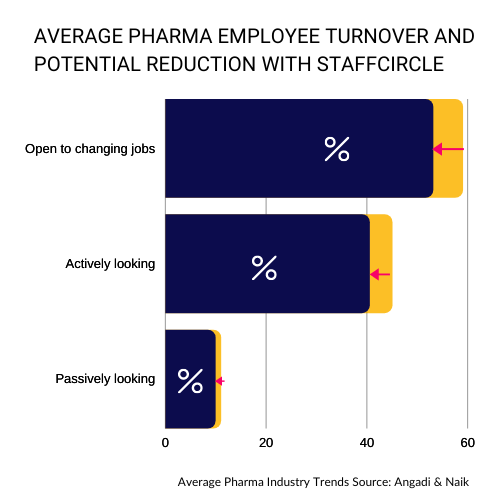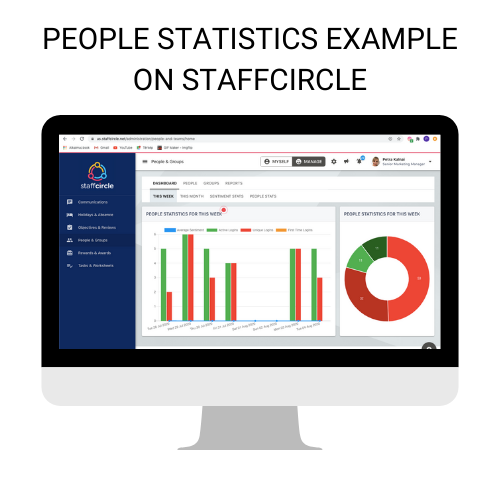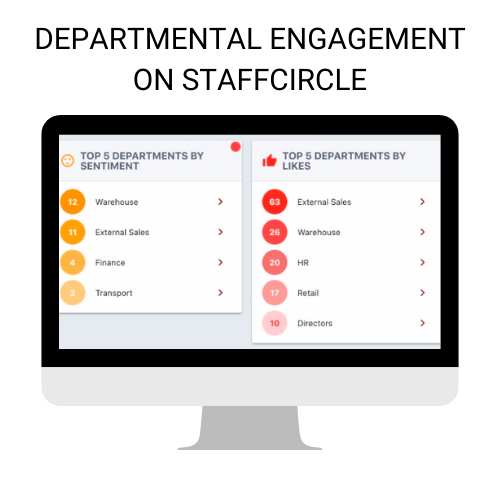
How biotech and pharma companies could reduce their employee turnover and increase engagement
Industry: Pharmaceutical and Biotech
Company Size: Up to 5000
Set up: Office based, distributed and global workforce
Whilst in most sectors, the biggest driving force behind the creation of a remote and dispersed workforce is Covid-19 the pharmaceutical industry had been affected even before the pandemic. Research by PwC highlights that 7% of the pharmaceutical and life sciences industries’ employees are non-British EU citizens, who frequently move around Europe. As such, staff turnover could be affected by Brexit. Furthermore, without a robust infrastructure for communication and performance management or the added benefits of culture, pharmaceutical and biotech companies are at high risk of losing their top talent and knowledge.
Organisations within the health and pharmaceutical sectors are experiencing a transition phase towards organisational efficiency and digital transformation. Many have seen positive results from implementing an HR solution that bridges multiple challenges across talent management, performance management/motivation and communication and information sharing.
- Reduce talent turnover – StaffCircle customers see a minimum of 10% reduction
- Achieve constant employee engagement – StaffCircle customers see engagement levels rise by 37%, from an average of 49% to 86%
- Performance Management – Make analytics driven strategic decisions
- 4 systems consolidated into 1. – Improve employee experience, remove admin time and reduce system spend by as much as 400%
Strategic Challenges

Talent Management – Retention and Turnover
The recent intense work of developing scientific breakthroughs has brought its own challenges when it comes to maintaining employee experience and engagement levels under great pressure. The whole sector is encountering fierce competition for top talent and needs to scale at a pace, so attracting and retaining high-quality knowledge workers is a critical objective for the HR function.
StaffCircle’s internal research reveals, that aside from pay, the lack of information and knowledge sharing platforms and the inability to collaborate are the main reasons for talent loss in this sector.

Unstructured Performance Management
Our recent survey has shown that many employees feel there is no clear link between performance appraisals and compensation evaluation. Whilst some companies may have a performance management system in place 47% of employers surveyed still use paper forms and rely on face-to-face appraisals in an office.
Thus, the infrastructure and processes often do not stack up in the new normal post-Covid. This can create internal rumours that not everyone is either recognised or compensated equally. The loss of transparency in the process is now compounded by the increase in people working remotely. Additionally, a lack of infrastructure for performance management can negatively impact succession planning which means mission-critical projects and initiatives are at risk.

Communications Challenges
The main post-pandemic communication obstacles of pharmaceutical HR functions are centred around developing relationships and strong collaboration with new and existing colleagues in a much more broadly dispersed environment. Now, when a sense of team and common purpose are essential in progressing multiple time-sensitive projects at pace, communicating effectively cross-functionally and across different teams and locations is a priority. Sharing ideas and creating continual problem-solving groups whilst empowering employees have become top management initiatives.

Solutions and Results
StaffCircle clients see at least 10% reduction in their talent turnover
Ideas and breakthrough sharing: By utilising StaffCircle’s communication module our NHS and healthcare clients were able to improve the way information was shared throughout the surgeries, which in turn had a positive impact on organisational culture and employee engagement. Whilst our biotech client can now easily share internal knowledge across their various scientist groups. Regardless of geographical location, management and employees are now able to share breakthroughs and ideas and give instant feedback on company initiatives.
Robust infrastructure: The impact of improvement in culture & communications combined with a robust infrastructure for performance management has led to better employee experience with the forecasted reduction of 12% in staff turnover. Employee replacement costs being around 2.5 times the salary of an individual in the industry, the savings are considerable.
Organisational culture: The better-developed organisational culture also facilitates the recruitment of right-fit talent, reducing the risk of future employee churn.

Performance Management – Analytics driven strategic decisions
Flexible Performance Management features: StaffCircle’s flexible performance management solution allowed our NHS, healthcare and biotech clients to keep their current Performance and Development Plan and appraisal systems, which filtered employees into categories of management and non-management employees.
Automatic Scheduling & Sophisticated Workflows: Supporting their already existing annual appraisal approach, many StaffCircle clients opt to introduce regular One2Ones using some of the software’s built-in templates. The initiative provides a mechanism for both employees and managers to give and receive feedback and measure progress on performance-related objectives. Sophisticated workflows and automatic scheduling ensure that reviews are completed in a quick and efficient way. The user-friendly intuitive interface enables staff to focus on life-changing work, rather than spending time on administration duties.
Data analytics: As progress is recorded within the system, leadership can analyse and utilise data to inform future strategic decisions. With such a comprehensive approach to people management data, our NHS and biotech clients can improve, adjust or tackle issues before they take root. They now have reporting capabilities on individuals, teams, departments and even geographical locations. One2Ones are also used as means of reward and recognition improving communication between management and individuals.
StaffCircle offers solutions for:
- Scheduling regular and bespoke shift patterns to work out allowance fairly and equitably
- Monitoring overtime beyond those shifts
- Using data to process pay accurately
- Keeping track of employee credentials, such as the expiration of licenses and work permits

Communications – StaffCircle clients see constant employee engagement with levels rising by 37%, from an average of 49% to 86%
Sentiment and information tracking: Process improvement initiatives are now easy for our clients in the healthcare and pharmaceutical sectors to track, with measurable employee contribution and sentiment. Their employees feel more empowered and there is a sense of ownership and accountability for quality and compliance. Training and Health & Safety communications can be shared via multiple channels, ensuring that information reaches all relevant teams and departments.
Internalising employee know-how: As a result of easy information sharing, our NHS and biotech clients are now able to develop and better internalise employees’ know-how of the organisation, leading to a high performing culture. Prior to implementing StaffCircle, there were no means of tracking employee engagement, which now averages around 73% across the board.
Attracting workforce: With millennials making up over 50% of the pharmaceutical and healthcare workforce, creating transparent and instant communications enables our clients within these segments to proactively address the expectations of this generation especially when it comes to the ability to communicate a solid vision.
We chose StaffCircle because we needed one system for our entire workforce, including both our Head Office staff and our scientists.
We can now drive culture and communicatiuns, measure global performance and make data-driven decisions with centralised analytics. The money-back SLA gives us confidence that we’re receiving an exceptional level of customer support.
HR Director, Healthcare



